September 26, 2007
Munich, Germany
My First Oktoberfest
by Lois Joy
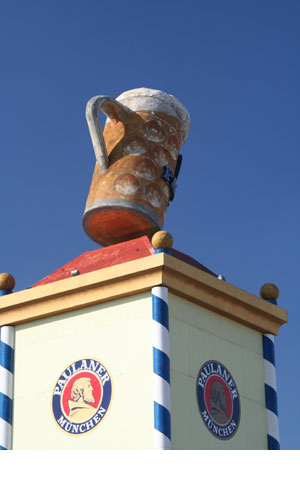 We
came here this time of the year, not solely to experience the OktoberFest,
but because of the good weather. On many previous visits, it has been rainy
and cold. The City of Munich knows something about when to attract 6 million
visitors to their fine city of 1.5 million residents; that is why they begin
their Festival during the last part of September. We were lucky to have a
perfect day with the sun blazing down as if we were in California. The very
next day, a cycle of rain settled in and a chill permeated the fresh autumn
air.
We
came here this time of the year, not solely to experience the OktoberFest,
but because of the good weather. On many previous visits, it has been rainy
and cold. The City of Munich knows something about when to attract 6 million
visitors to their fine city of 1.5 million residents; that is why they begin
their Festival during the last part of September. We were lucky to have a
perfect day with the sun blazing down as if we were in California. The very
next day, a cycle of rain settled in and a chill permeated the fresh autumn
air.
The following is the promotion from the
Oktoberfest Website:
Think Germany and most people think of Oktoberfest
-
huge steins of beer, singing, platters of sausages, men dressed in Lederhosen
and ladies dressed in Dirndls. Oh, and 100,000 or so other people to party
with! Held the last two weeks of September into the first week of October
because of Munich's great fall weather, Oktoberfest has been a tradition for
almost 200 years.
Dates :
2007 Sep. 22nd-Oct. 7th
2008 Sep. 20th-Oct. 5th
2009 Sep. 18th-Oct. 3rd

Oktoberfest is one great big international celebration, a 16-day party with
visitors from all over the world. Gunter’s relatives here advised us
that the opening week-end would be jammed, so we opted to attend on the first
Monday. We dutifully watched the opening ceremonies on TV. beginning with
the mayor of Munich tapping the first barrel of beer and making the traditional
announcement “O’zapft is” (“It has been tapped”).
During the ceremonial opening of the fest, the families of the festival hosts
and breweries arrive in coaches adorned with flowers. The bands of the festival
tents, the waitresses in decorated carriages and the magnificent horses and
carts of the Munich breweries enter the festival-grounds. This procession
is lead off by the “Münchner Kindl” – Munich’s
symbol figure – on horseback, followed by the festival coach of the
Lord Mayor of Munich.
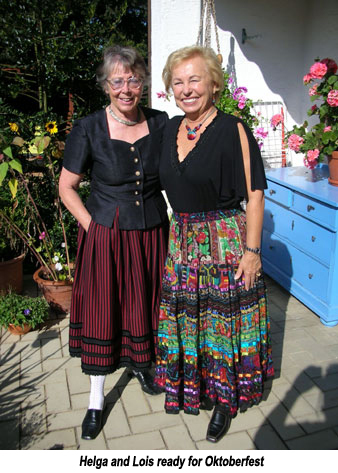 What
I do want to attend next time, though, is The procession of folklore and marksmen
groups always on the first Sunday of the Oktoberfest. Some 9.400 persons from
Germany, Austria, Italy, Croatia, Romania, USA and other European countries
participate in this festival parade which is some seven kilometres long. Highlights
are historical uniforms, marksmen, folklore groups, local bands, bandsmen
and thoroughbred horses. This folklore procession was held for the first time
in 1835 on the occasion of the silver wedding anniversary of Ludwig I. and
Therese von Bayern.
What
I do want to attend next time, though, is The procession of folklore and marksmen
groups always on the first Sunday of the Oktoberfest. Some 9.400 persons from
Germany, Austria, Italy, Croatia, Romania, USA and other European countries
participate in this festival parade which is some seven kilometres long. Highlights
are historical uniforms, marksmen, folklore groups, local bands, bandsmen
and thoroughbred horses. This folklore procession was held for the first time
in 1835 on the occasion of the silver wedding anniversary of Ludwig I. and
Therese von Bayern.
“Who are they?” I asked, and before you know it, I was deep into history going back centuries:
While we all know it as Oktoberfest, the actual German term for Oktoberfest is die Wiesn - a contraction of the word "Wiesen" which means meadow or field. The original Oktoberfest was held on the fields in front of the city gates which were later renamed "Theresienwiese" (Theresa's fields).
The first Oktoberfest was actually a wedding celebration party. Prince Ludwig of Bavaria, who was later crowned King Ludwig I, wanted the people of Munich to share in the celebration of his marriage to Princess Therese of Saxony-Hildburghausen on October 12, 1810. He organized a horserace, offered copious amounts of beer and food, invited all the people of Munich and voila! Oktoberfest was born.
The festival was such a success that Ludwig decided to hold it again the
following year in conjunction with the state agricultural festival. In 1816
carnival booths were added and in 1819 the town fathers of Munich decided
that the festival should be celebrated every year. Over time, the length of
the festival was increased and the date moved backward because of the great
weather at the end of September in Bavaria.
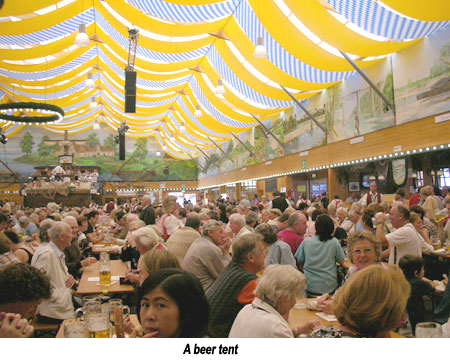
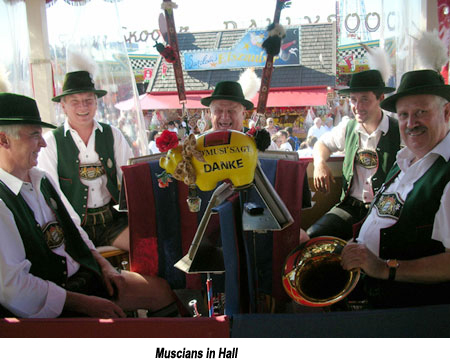
Since its beginnings the Oktoberfest has thus been canceled 24 times due to
war, disease and other emergencies. By 1960, the last year that horse races
were held, Oktoberfest was already a world-famous festival. The mother of
approximately 2,000 “Oktoberfests” celebrated at different venues
and in varying measures all over the globe, Oktoberfest Munich is the king
of festivals. Prost! Here’s to King Ludwig and Therese!
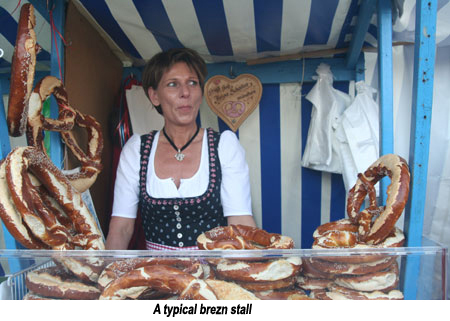 So
as we left the Sbahn and the Ubahn and walked along a street named Theresienwiesestrasse,
I was getting the hang of these long street names, “Aha, the street
of Theresa’s meadow!” First, we walked along a long open area
lined with tents—some small tents—others changed to giant brewery-sponsored
beer halls that can hold up to 5,000
So
as we left the Sbahn and the Ubahn and walked along a street named Theresienwiesestrasse,
I was getting the hang of these long street names, “Aha, the street
of Theresa’s meadow!” First, we walked along a long open area
lined with tents—some small tents—others changed to giant brewery-sponsored
beer halls that can hold up to 5,000 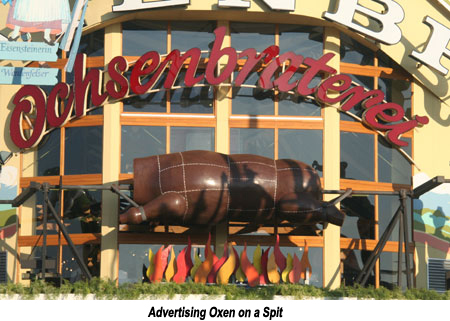 people
apiece. Frescoes even emblazon the ceilings! We stayed the full day and left
in the early evening. I understand that this is when it really gets wild in
these tents, though, with exurberant dancing on the long tables! Granted,
at the main and side entrances to the beer tents vendors are selling giant
Oktoberfest pretzels, bread rolls, salt sticks, foot-long sausages, and even
fish sandwiches, etc. In addition, there are stalls selling sweets, ice cream,
fruit juice, fruits, espresso and souvenirs.
people
apiece. Frescoes even emblazon the ceilings! We stayed the full day and left
in the early evening. I understand that this is when it really gets wild in
these tents, though, with exurberant dancing on the long tables! Granted,
at the main and side entrances to the beer tents vendors are selling giant
Oktoberfest pretzels, bread rolls, salt sticks, foot-long sausages, and even
fish sandwiches, etc. In addition, there are stalls selling sweets, ice cream,
fruit juice, fruits, espresso and souvenirs.
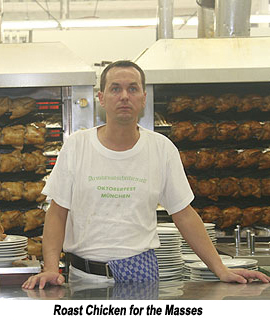 But
one goes into the tents for the wonderful food. How they can prepare it so
well in such large quantities is a mystery to me, but our grilled beer-batter
chicken was out of this world! Imagine preparing 460,000 chickens and 104
oxen! Of course, I had a lesson in how to hold and drink the special Oktoberfest
beer out of giant mugs !
But
one goes into the tents for the wonderful food. How they can prepare it so
well in such large quantities is a mystery to me, but our grilled beer-batter
chicken was out of this world! Imagine preparing 460,000 chickens and 104
oxen! Of course, I had a lesson in how to hold and drink the special Oktoberfest
beer out of giant mugs !
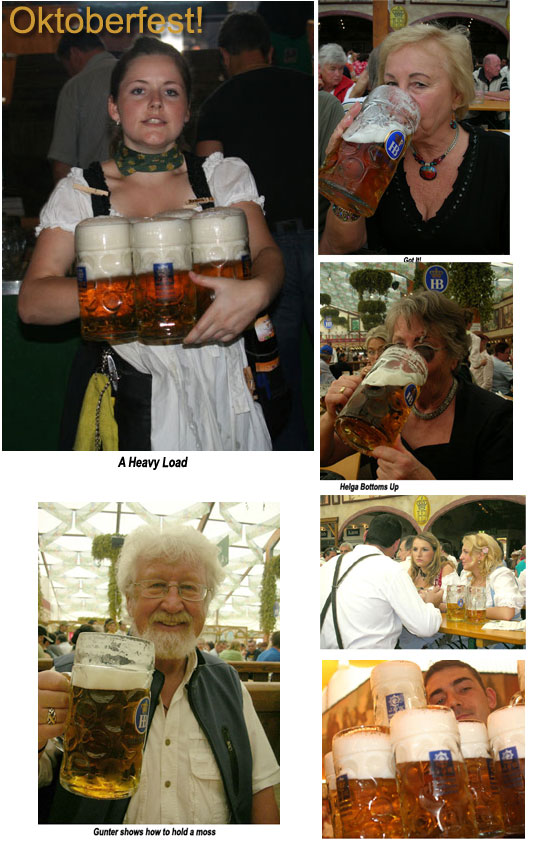
On full stomachs, we sauntered through the fairway, filled with the usual games and rides that one would find in a typical State Fair in the States. Here are some views from the Ferris Wheel:
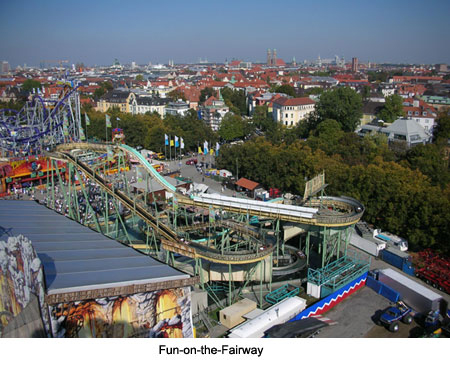
A bigband open-air concert of all Oktoberfest bands with some 300 musicians took place on the second Sunday of the festival. For the grand finale of the Oktoberfest on the last Sunday, some 60 marksmen saluted their farewell accompanied by the band of the marksmen’ tent. But by then, we were on our way to Sudtirol (South Tyrol), Italy, the subject of my next story (see Snapshots of Sudtirol).
Der Spiegel reported that this year's Munich Oktoberfest ended with new records for beer and oxen consumption and for the number of false dentures found. “Rowdy it may be, but the festival, just like last year's World Cup,” the newsmagazine reported, “seems to be exporting a positive image of Germany. The 174th Munich Oktoberfest closed its beer tents on Sunday after 16 days of debauchery that attracted 6.2 million visitors who drank 6.7 million liters (the equivalent of 11 million pints) of beer, ate 104 oxen and lost three sets of false teeth. Some 50 lost children were also recovered.”
Fun Oktoberfest
Facts:
• 30% of the year's production of beer by Munich breweries will be
consumed in the two weeks of Oktoberfest.
• 12,000 People are employed at the Oktoberfest. Of these, 1600 are
waitresses.
• There is available seating for 100,000 people.
• The six Oktoberfest breweries, (Spaten, Augustiner, Paulaner,
Hacker-Pschorr, Hofbräuhaus, Löwenbräu) sold
6 million mugs of beer in
2005 (5.5 million in 2004).
• Roasted oxen: 88
• Sausages: 220,000 pairs
• Roast chickens: 460,000











